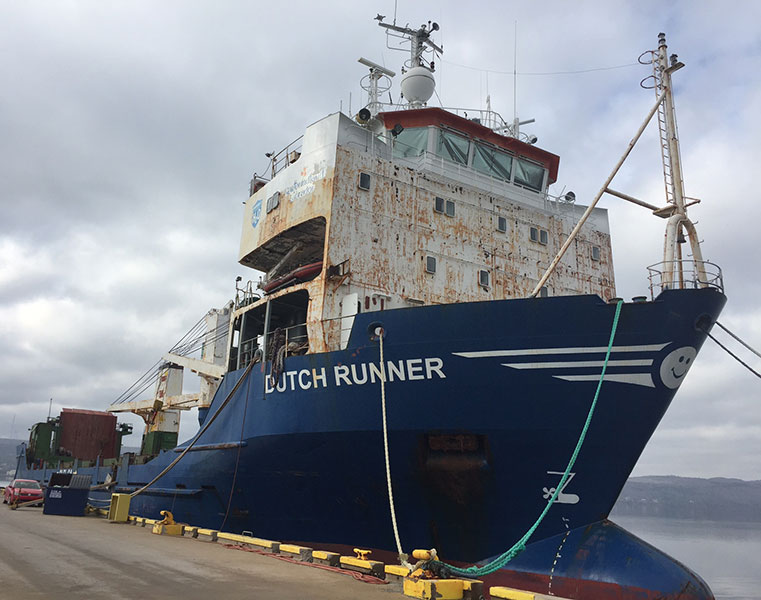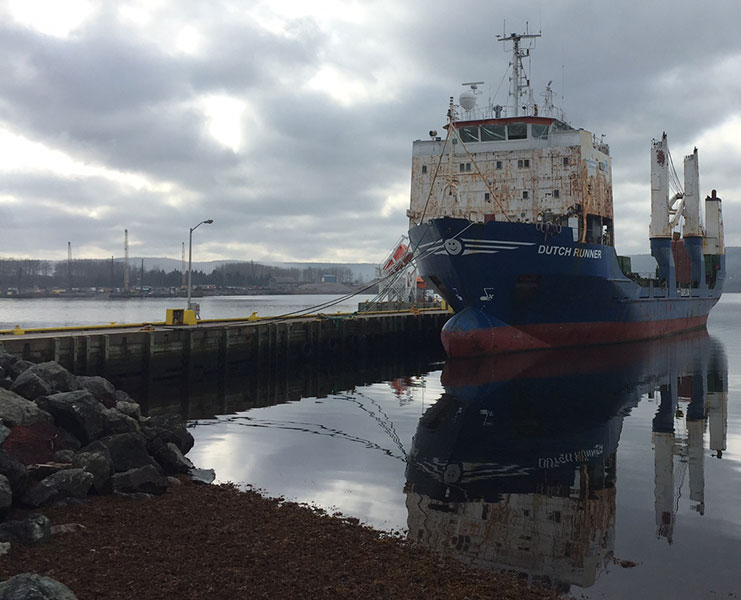
PORT HAWKESBURY: A cargo ship moored at this town’s Strait of Canso Superport Corporation (SCSC) pier for the past 14 months is ready for its final inspection but may still be “several weeks” from its formal departure, according to a representative of the ownership group overseeing the MV Dutch Runner.
Alco International Trading Corporation (AITC) executive director Bomboy Pascal told The Reporter last week that his company is a month behind its previously-stated pledge to remove the ship from the Port Hawkesbury Pier before the end of December because of difficulties assembling the nine-member crew required to be on hand for a craft inspection to be conducted by officials from Panama, the Dutch Runner’s eventual destination.
Pascal claimed that AITC sent SCSC documentation in late January proving that “there’s nothing wrong with the ship,” which has just undergone a full cleaning and an underwater survey of its hull, and added that the company is working with hiring agencies in Panama and the Dominican Republic to secure its nine crew members, including a captain and a chief mate.
“We cannot get two or three guys and bring them to the ship while we’re still looking for the other five guys – it doesn’t work,” Pascal insisted during an interview from AITC’s offices in Hamilton, Ontario.
“It could take several weeks. Without the crew, we cannot even move forward. The final inspection was scheduled to take place before Christmas, but even that cannot take place without the complete crew on board.”

These comments came a week after a veteran Strait area mariner, Derek Kruger, accused AITC and the Dutch Runner’s now-bankrupt previous owners, Great Lakes Feeder Lines, of negligence with regards to the ship’s condition, its crew members, and the various wharf facilities that have housed – and, in some cases, rejected – the cargo vessel over the past five years.
Kruger, who captained the ship during its previous ownership by Great Lakes Feeder Lines, pointed out that its sustained presence at port facilities in Nunatsiavut, Newfoundland in 2011 led to a backlog of freight designed to reach the northern Labrador coastline, followed by claims from local officials of damage to the port that hosted the Dutch Runner for several months.
“This ship has got a history of condemnation,” said Kruger. “People didn’t want it on the Labrador coast – it was too slow, it was this, it was that, it was having problems. And they had just cause…”
Similar concerns arose in the ship’s follow-up destination of Souris, Prince Edward Island, where Kruger was asked to remove the vessel from the community’s Booth Fisheries wharf after complaints of damage to the local dock.
“She was ordered off the dock by the port authority in Souris, because she did damage to the dock and the dock was caving in because she was banging against the dock,” Kruger recalled. “It was correctly moored, but after three years of banging on the dock, it’s going to wear away the dock.”
In response to Kruger’s prediction that similar damage could occur at the Port Hawkesbury Pier, which has hosted the Dutch Runner since it left Souris in late 2015, SCSC chief executive officer (CEO) Tim Gilfoy pointed out that the local port corporation’s crews installed reinforcements along the wharf facility prior to the cargo ship’s arrival.
“When it did come here, we put some extra bumpers in to protect our facility,” Gilfoy explained. “These wharves are designed to take a pretty good strain, but these extra bumpers prevent damage to the wood structure – it holds it off a bit.”
Noting that he and his fellow Superport Corporation officials “are frustrated” with the crew hiring issues that have prevented the conclusion of the ship’s stay in Port Hawkesbury, Gilfoy simultaneously stressed the difficulty in safely completing the pre-inspection stage of refurbishing a large vessel and preparing it for a proper inspection at this time of year.
“Obviously, we’re going to be cautious about forcing them out in bad weather conditions – there’s a safety issue here. But we’re still working on having the vessel removed.”
However, the onset of poor weather hits home for Kruger as it magnifies a point that he has made many times over the course of his most recent involvement with the Dutch Runner – specifically, reports of poor working conditions aboard the ship.
Five Dutch Runner crew members – including three Peruvians and one worker from each of Honduras and the Dominican Republic – left the boat on November 7 and filed an official complaint with Transport Canada, nearly three months after they arrived in Port Hawkesbury. At the time, the Atlantic Canadian inspector with the International Transport Workers Federation, Karl Risser, declared that the crew members had not been paid in several weeks, were relying on the generosity of community residents to secure food, and did not have proper heating or electricity to accommodate their living quarters on the ship.
Kruger suggested that this was a common practice throughout the Dutch Runner’s stay in Port Hawkesbury. He noted that AITC had requested his assistance with the ship’s preparation for its transfer from Canadian to Panamanian ownership in the years following his official captaincy of the vessel. However, during this period, he spent several hundred dollars on everything from phone bills to groceries for crew members – money that Kruger is still awaiting t to be reimbursed to this day.
“These people abused my trust,” declared Kruger, who has taken the matter to Small Claims Court at the Port Hawkesbury Justice Centre.
This period also saw Kruger apply to the Halifax Seaman’s Mission for assistance with a crew member from El Salvador, Miguel Angel Alvarez Medrano, who was left “destitute” and awaiting several weeks of back pay while living on a boat with “no running water, no toilet water, no power, no food or supplies,” according to documentation exchanged between Kruger and Seaman’s Mission chaplain Rev. Maggie Whittingham-Lamont.

Questioned about these patterns regarding the ship’s condition and the parent company’s treatment of its crew members, Pascal insisted that these claims are “not exactly right” and declared that wages and food are properly distributed by an on-site administrator hired by AITC. He also added that AITC is as anxious as local residents to remove the Dutch Runner from Port Hawkesbury.
Despite his difficult experiences with the Dutch Runner over the past five years, Kruger says he “can’t blame” the Superport Corporation for taking in the vessel, particularly with the regular payment of berthage fees by AITC to the SCSC.
“I sympathize with the people of Port Hawkesbury and the surrounding area, because I don’t think the people of Port Hawkesbury should be subject to this type of abuse. I think that they deserve better, and I think it’s high time that the owner of the boat give some positive direction in terms of what’s going to happen to this boat.”

